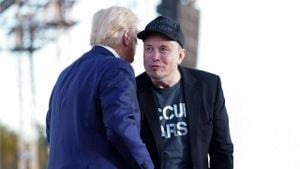Israeli Prime Minister Benjamin Netanyahu recently took swift action following violent confrontations involving Israeli football fans in Amsterdam during a Europa League match. This match, where Maccabi Tel Aviv faced Ajax Amsterdam, spiraled out of control post-game, leading to clashes and vandalism, prompting the PM to dispatch two rescue planes to the Netherlands.
Reports indicate this unexpected violence unfolded after the match on Thursday, which ended unfavorably for Maccabi Tel Aviv, suffering a 5-0 defeat. While there were no incidents reported during the match at the Johan Cruyff Stadium, tensions escalated as fans left the venue. Outside the stadium, pro-Palestinian protesters, having been denied permission to gather near the grounds, began to move toward the stadium, creating chaotic scenes.
Amsterdam police confirmed the detention of 62 individuals as they attempted to manage the volatile situation. The atmosphere grew significantly more hostile, with reports of violence directed at supporters of the Israeli team. By the end of the night, five people had sustained injuries and required hospital treatment.
The incident ignited widespread outrage, with Israeli officials, including the Minister for National Security Itamar Ben-Gvir, condemning the actions as antisemitic. He characterized the attacks as being rooted deeply in animosity toward Jewish identity and Israeli nationality. “Fans who went to see a football game encountered antisemitism and were attacked with unimaginable cruelty just because of their Jewishness and Israeliness,” Ben-Gvir expressed through social media.
Following the violence, Israel’s national security ministry issued warnings to its citizens, advising them to remain within their hotel rooms. There were communications between Israeli and Dutch officials to coordinate safe passage for the affected fans back to Israel.
Reacting to the troubling events, Netanyahu underscored the severity of the attacks, branding them as ‘premeditated antisemitic violence’ aimed at those supporting Maccabi Tel Aviv. He promised unequivocal support for the safety of Israeli citizens abroad and ordered the military to prepare for immediate rescue operations involving medical and rescue teams.
Dutch authorities expressed their dismay, with Prime Minister Dick Schoof labeling the attacks as wholly unacceptable. Schoof and Netanyahu spoke by phone, affirming their shared commitment to bringing the perpetrators to justice. The rapid response from the Israeli military, which announced the deployment of cargo aircraft for the rescue mission, reflects tensions surrounding the incident.
Social media footage depicted chaotic scenes on the streets of Amsterdam, raising alarms about potential hostage situations and prompting police interventions. Security efforts intensified but did not shield fans from violence once they congregated outside the confines of the stadium.
Chanan Hertzberger, chair of the Central Jewish Consultation, expressed grave concern over the rise of extremist antisemitic groups operating under the guise of supporting Palestine. He referred to the events as reminiscent of past pogroms and called for immediate action against such violence, particularly highlighting the unfortunate timing as this occurred on the anniversary of Kristallnacht, the infamous event marking the onset of large-scale violence against Jews during the Nazi regime.
Deborah Lipstadt, the U.S. envoy for antisemitism, echoed calls for investigation and heightened security measures to protect vulnerable communities.
Geert Wilders, the leader of the far-right Freedom Party, criticized his government for not addressing the situation with greater urgency. His remarks indicate rising tensions within Dutch politics on how to handle antisemitic incidents amid broader discussions around national security and citizen safety.
With numerous arrests and injuries resulting from the clashes, the authorities have opened comprehensive investigations targeting the causes of the violence and the role of organized groups within the protests. Meanwhile, there is considerable concern about the looming threats facing Jewish communities across Europe and how governments can bolster defenses against such acts of hatred.
This incident not only highlights the intersection of sports, international relations, and social justice movements but also raises pressing questions about how to counteract violence rooted in intolerance. The ramifications of these clashes will likely reverberate beyond Amsterdam, affecting the broader dialogue on identity, nationalism, and security throughout Europe.



